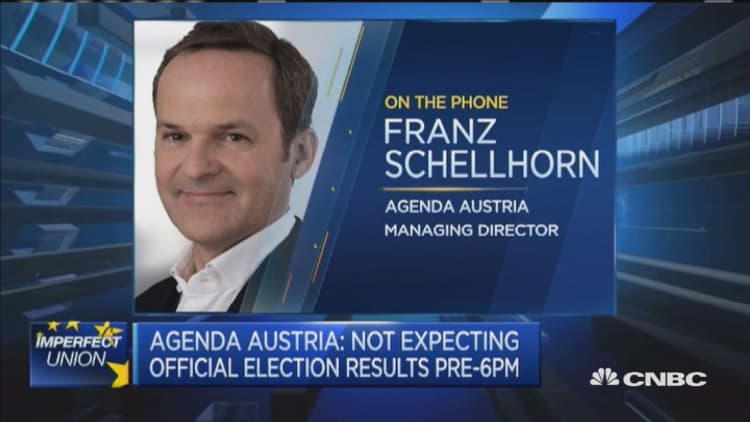Green Party candidate Alexander Van Der Bellen has won Austria's presidential election, scoring a narrow victory over Norbert Hofer of the far-right Freedom Party of Austria, according to official provisional results.
Der Bellen's victory prevents Hofer becoming Austria's first far-right president since the end of World War II.
The election was very close, with Hofer appearing to lead on Sunday. However, postal votes counted on Monday gave Van Der Bellen the victory.
Van der Bellen won 50.3 percent of the vote, compared to Hofer's 49.7 percent after postal votes were in, the Austrian Interior Ministry said.
Hofer conceded defeat in a post in German on his Facebook page on Monday.
"Of course I'm sad today. I would like to watch out for you as president of our wonderful country. I will remain loyal to you and make my contribution for a positive future of Austria," he said.
The weekend's voting was the second-round of the presidential election, following a first round in April that was won by Hofer. However, he failed to gain an overall majority, resulting in this weekend's run-off.
The Freedom Party of Austria is viewed as right-wing to far-right, with a populist slant to its policies. It strikes a hardline on immigration, which is particularly contentious in Austria in the wake of Europe's refugee crisis.
Hofer's opponent and Austria's soon-to-be president, Van Der Bellen, came second in the first round.
"This victory in extra time may bring some relief to European policymakers and financial markets as the feared scenario of a populist at the head of a core euro zone country has not materialized after all," Carsten Brzeski, the Frankfurt-based chief economist at ING-DiBa, said in a note on Monday.
"Nevertheless, the result also stresses that almost half of the Austrian voters in fact did vote for right-wing populist Hofer and seem to sympathize with a very strict stance on Austria's refugee policy and a very distant relationship with the European Union (EU)," he added.
Van Der Bellen will be the first Austrian president since World War II without the backing by one of the two main parties. This would have applied to Hofer too, had he won.
In a conference call on Friday, the president of the Austrian Central Bank, Claus Raidl, said Hofer's putative success was "not flattering for us, to say the least."
He added that Hofer's Freedom Party had failed to distance itself from the Nazi rule of Austria from 1938 to 1945.
"In Austria … we have the burden of the past and this Freedom Party … never really drew a red line through the past," Raidl said.
Hofer, who worked as an aeronautical engineer before turning to politics, has struck a more pragmatic line as party leader compared to his polarizing predecessor, Heinz Christian Strache. This may have helped Hofer make inroads in more centrist constituencies.
The presidential role is a largely symbolic one in Austria, with the main leadership coming from the chancellor. Werner Faymann of the Social Democratic Party resigned from this role last week, after his popularity was hit by his handling of the refugee issue. He has been succeeded by Christian Kern.
"He (the president) is more of a figurehead," Raidl said.
"The chancellor is not the boss of president, but the president is also not the boss of the chancellor … He cannot dissolve parliament … the only thing he can do, but this has never been done, he can dismiss the chancellor and the government…. I think (this) will never happen," he added later.

Populist parties have gained traction with voters in Europe ever since the global financial crisis of 2007-08. Right-wing populist parties outside of Austria, include the United Kingdom Independence Party (UKIP), the Front National in France, Alternative for Deutschland in Germany and Golden Dawn in Greece.
"The Austrian vote is another example ... that populist parties do not only flourish during recessions or in economically difficult times. Populist parties can also be successful in core euro zone countries, which enjoy healthy economies with low unemployment rates. This observation, combined with the notion of growing frustration with grand coalitions, should be a clear warning signal to Germany but also to the rest of the euro zone," Brzeski said.
Manuel Valls, France's prime minister and member of its ruling Socialist Party, congratulated Austria on its election results on Monday.
"Relief to see the Austrians reject populism and extremism. Everyone must learn from Europe," he said in a Twitter post in French.

